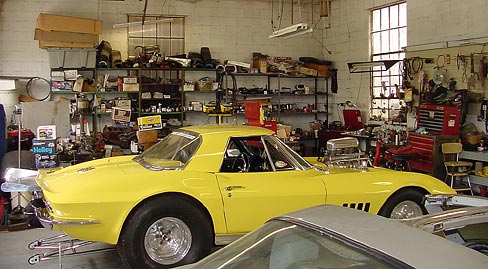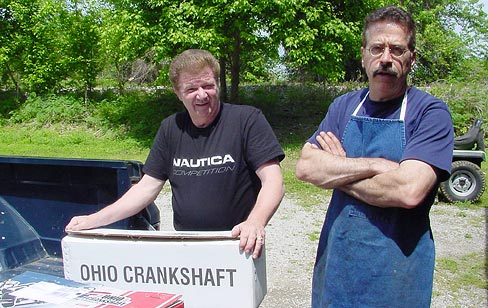

Before we got started, we mocked
up the crank and a rod and found the block would
require a little more machining for clearance
plus we needed to bore it .030, so we took the
wholedeal over to Bill's buddy and machinist
extraordinaire Don Kulash at Precision Engine
Service. We promised him the usual fame and
fortune if he would do the finishing work we
needed. (If I were doing this project over I
would probably just order a cast iron block
from Dart. They will custom machine one of their
blocks and deliver it ready to go for less money
than I spent to make the stock block work.)
Don clearanced the block so the
rotating assembly would spin without hitting
anything and bored the block. He also "squared"
the decks and cylinders and adjusted deck height
without our even asking that it be done. Kulash
is one of those picky kinds of machinists that
has to make sure everything is perfect whether
you ask for it or not. Shop owners/machinists
like Kulash are the do-it-yourself racer's best
friend.
So, after about three months of
gathering parts -- and with the wrath of DRO
bracket editor Jok Nicholson descending on us
to get the engine built because he had finished
the Vega -- we were finally ready to assemble
the engine.

Bill Weckman and Don Kulash
It took Weckman (whose budget blower motors
are legendary around the St. Louis street racing
scene) and myself about two days to put the
engine together, starting with just a bare block.
Actually, I'd like you to believe that assembling
this engine required a lot of expertise, but,
to be honest, anyone reading this story could
do it with just a little help. The big secret
was simply to get components from well-known
manufacturers with good reputations, then trust
and follow their directions.
The first thing Weckman made me do was to thoroughly
clean the block using soap, water, cleaning
solvent and some compressed air. I spent about
an hour cleaning and scrubbing the block and
all of the oiling passages.

|